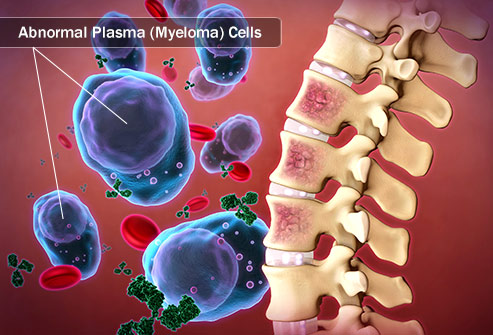
Multiple myeloma is a type of cancer that occurs when certain white blood cells grow rapidly and in an uncontrolled manner. The cancerous cells then secrete abnormal proteins that can weaken your organs and damage the immune system.
Depending on the type of multiple myeloma present, the disease can be asymptomatic, although in some instances, symptoms may be debilitating. One major factor that affects myeloma’s prognosis is which of the three stages of multiple myeloma is present at the time of diagnosis.
Myeloma symptoms can be challenging to manage. Talk to your doctor about ways to reduce your discomfort, and consider some of the following options to improve issues like bone pain, fatigue, and neuropathy.
Bone Pain
Pain management is often a critical part of treating and managing multiple myeloma. The condition can weaken bones and cause pain, which typically occurs in the back, skull, hips, and ribs. The following home therapy options can help reduce your pain:
- Massage can ease pain, particularly when used with cocoa butter.
- Over-the-counter pain medications may help reduce pain and improve mobility, if your doctor approves of them.
- Using a back brace can help relieve pain stemming from the spine.
Fatigue
Fatigue is a common symptom experienced by people with myeloma, and may be caused by the disease or the treatments that your care team uses.
The following tips can help you deal with fatigue on your own time and in your own home:
- Be sure to not only get enough rest in the evenings, but to also schedule rest periods during the times of day when you’re typically most fatigued.
- Relaxation techniques like yoga, aromatherapy, and reflexology can help reduce fatigue.
- Eat a well-balanced, healthy diet to ensure you’re giving your body the energy it needs to fight the cancer, heal, and keep yourself going.
- Although it may seem counterproductive, research indicates that moderate exercise regularly can substantially reduce fatigue.
Neuropathy
Neuropathy is typically characterized by tingling, burning, sensitivity, or numbness, usually felt in the extremities. If the neuropathy is caused by chemotherapy or other myeloma treatments, it may persist for months after treatment ends. The following tips can help address peripheral neuropathy:
- Moderate exercise for 20 to 30 minutes a day can improve blood circulation.
- Eat a healthy, well-balanced diet rich in vitamins.
- Stay hydrated by drinking plenty of water and avoiding alcoholic beverages.
- If you’re a cigarette smoker, it’s highly recommended that you drop the habit.
Precise Knowledge Is Power
The ability to precisely report to your treatment team the location, date of onset, severity, and frequency of the above symptoms is your best weapon in managing myeloma symptoms. This information will ensure that your doctors can find a cause, and thereby a solution to the problem. With this much detail, along with an examination and tests to confirm the source, relief is much closer.